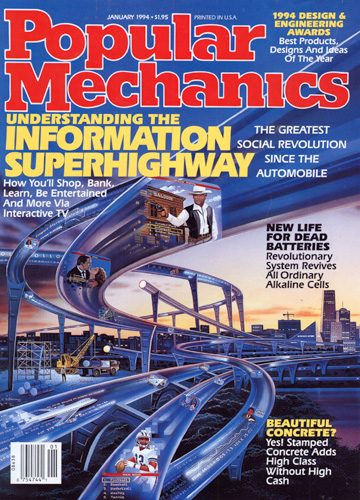 I was reminded of this yesterday while giving a presentation to a group of publishers at Stanford's Publishing on the Web course run by Holly Brady and Janet Wright. Except this time I had a little more perspective than my view only a year out of university back at Amdahl.
I was reminded of this yesterday while giving a presentation to a group of publishers at Stanford's Publishing on the Web course run by Holly Brady and Janet Wright. Except this time I had a little more perspective than my view only a year out of university back at Amdahl.They were there to learn smart strategies for operating their businesses. I was there to talk about RSS, Tagging, Social Networks and the pending threats and opportunities for publishers in the new world. (PowerPoint 6.3MB)
I struggled a bit coming up with a thesis for my talk. I wanted to go through the implications of these new things on the content business, but it wasn't until I looked up "Mashup" in Wikipedia that the message became clear to me.
Telling the Web 2.0 story is full of buzziness that only a VC can love. But when I positioned the talk around 'Mashups' I think I stumbled on a concept that people can lock on to.
I started with a definition of Mashup by talking about music, sampling and Hip Hop. Everyone understands that.
I then went through the trends I see affecting publishers in terms of their home page traffic (RSS readers and new browsers taking away attention), navigation (semantics and tagging becoming the new concepts for user interfaces) and then communities that are forming in different ways (social networks driving usage away from publishers).
I followed that by explaining how these pieces can contribute to a 'Mashup' using a few examples like the Yahoo! Event mashup, BBC's various traffic mashups and Trulia.
Finally, I went through a few concepts for business models and then stepped through the various arguments against making your content more Mashup-friendly, posing some challenges to each.
The response seemed mixed, but based on some of the questions I got ("Explain again how I make money with someone else using my content?" and "How can I track what's happening with my content out there?") and even some of the challenges ("You're saying that I should encourage people to take my most valuable content and reuse it? No. I don't see it." and "Isn't a mashup copyright infringement?") the message of what a Mashup is got through.
From what I could tell, everyone in the room understood Web 2.0 despite the fact that I didn't once mention the term. Remember the idea of the "Information Superhighway"? That was a very effective way of grasping the Internet in 1994. It seems the "Mashup" might be the smartest way to give today's Internet trends life for the non-technical.
Comments:
Comments:
Re: How to present Web 2.0 ideas that resonate with non-technical people
by
stephrieger
on Tue 06 Dec 2005 08:52 AM EST
What a brilliant approach, and one that certainly resonates with me. I've be talking to a lot of people about open content lately-and consequently, open standards, mashup and content discovery, which innevitably leads to discussions of tagging, personal publishing, metadata, and many other web 2.0 concepts.
What I find intesting is how much easier it is for people to get involved in the conversation if they have direct issues they can relate with. So for one person, it becomes a discussion about how they can't find music they can use for a podcast, for another, it may be about lack of useable materials for teachers, while a third may simply love the idea of being able to do something with content they find interesting to them (all real stories BTW.) Technology or the internet may not even be the dominant issue in the problem or need that they have and web 2.0 then simply becomes a conversation about useful (and potentially profitable) ways to enable creativity and personal expression.
What I find intesting is how much easier it is for people to get involved in the conversation if they have direct issues they can relate with. So for one person, it becomes a discussion about how they can't find music they can use for a podcast, for another, it may be about lack of useable materials for teachers, while a third may simply love the idea of being able to do something with content they find interesting to them (all real stories BTW.) Technology or the internet may not even be the dominant issue in the problem or need that they have and web 2.0 then simply becomes a conversation about useful (and potentially profitable) ways to enable creativity and personal expression.

Honestly, from talking to the rest of the workshop crew I got the idea that social media was not on a single radar screen. But that all changed. I don't know how many conversations got spawned over dinner that dealt with the 'community' aspect of the websites. And it all got backed up by Charlene Li's talk the following day on Social Networking.
It was a good (and eye-opening) one/two punch.
Curt